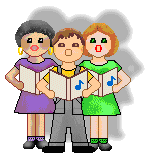- Dunning Elementary
- Specials
- Music
Classrooms
Page Navigation
Dunning Music
-
Welcome to Music Notes!
Hello, I am Mrs. Hagarty. It is such a privilege to be working with you and your children as we begin another school year together! Please check out our website as the year progresses to find updated announcements and related curriculum information. I look forward to another fabulous year of learning and exploring this rich and meaningful language which is: MUSIC!
Check out these websites for some fun:
Play your recorder along with the music...just like we do in class! Music Express link
"Dexter The Dragon"songs http://dexterdragon.com/content/login.php
Try this link for some games, a recorder fingering chart, and song downloads! http://www.musick8kids.com/
Would you like some practice at memorizing your music staff letter names? Try the game at:
hhttp://www.classicsforkids.com/games/notename/notename.html
Let's take a peek at what music at Dunning is all about...
The music room at C.A. Dunning is a busy place where singing, playing classroom instruments, creative movement and smiles are a daily occurrence! Whether marching in a rhythm band, strutting around like a Thanksgiving turkey or beginning recorder instruction; students are engaged in age appropriate activities which introduce and reinforce the concepts of rhythm, melody, harmony, form, and tone color to name a few.



Basic music fundamentals are introduced in grade K-2 and are developed in grades 3-5. We integrate music lesson concepts with classroom curriculum content when relevant, providing an extension of materials and experiences for the children. Performance opportunities are available at our annual “Winterfest” student assembly, as well as the annual “Third Grade Recorder Concert” which takes place in the spring.



Music is a wonderful means of expression and a language all its own. We are very excited to begin this musical journey together, and hope that it will lead to life long musical experiences for our students. Whether listening or playing, watching or participating, may you always carry a song in your heart, and may the joy of making music bring out the “child” in all of us!
Our music classroom philosophy, materials, and activities, are aligned with the Massachusetts Music Curriculum Frameworks:“Music has a tremendous value as an academic discipline. It contributes to the understanding of other subjects. In school there’s a tremendous difference between learning and doing. With music, you do both.” Joan Schmidt, Board Member, National School Boards Association
Through music education students become fluent in the language of music as artistic, intellectual, and cultural expression. Performing, creating, and responding to music provide means for development and growth. Learning to read and notate music opens for students the limitless body of musical styles, forms, and repertoire, and allows them to see what they hear and hear what they see. Fluency in music brings understanding of contemporary and historical cultures, as well as self-knowledge. Music includes forms such as folk, popular, band and orchestral music, gospel music and oratorio, jazz, opera, and musical theatre.The PreK–12 Standards for Music in this Strand:
1. Singing. Students will sing, alone and with others, a varied repertoire of music.
2. Reading and Notation. Students will read music written in standard notation.
3. Playing Instruments. Students will play instruments, alone and with others, to perform a varied repertoire of music.
4. Improvisation and Composition. Students will improvise, compose, and arrange music.
5. Critical Response. Students will describe and analyze their own music and the music of others using appropriate music vocabulary. When appropriate, students will connect their analysis to interpretation and evaluation.
Contact Us
-
Kelly RobergeGeorgia Voulgaraki

